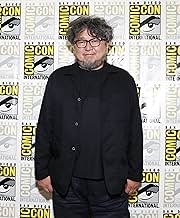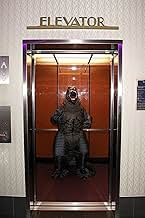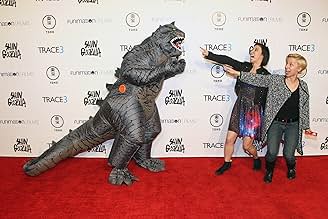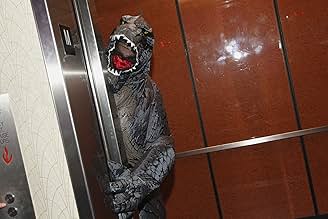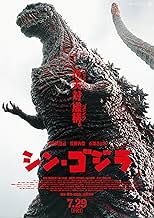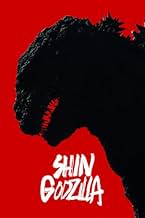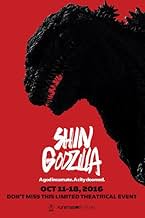Após um acidente na baía de Tóquio, uma criatura gigante chamada Godzilla aterroriza todo o Japão.Após um acidente na baía de Tóquio, uma criatura gigante chamada Godzilla aterroriza todo o Japão.Após um acidente na baía de Tóquio, uma criatura gigante chamada Godzilla aterroriza todo o Japão.
- Direção
- Roteiristas
- Artistas
- Prêmios
- 13 vitórias e 10 indicações no total
- Direção
- Roteiristas
- Elenco e equipe completos
- Produção, bilheteria e muito mais no IMDbPro
Avaliações em destaque
The film takes a somber, serious tone as to what would happen if Japan were attacked -- in this case, by a seemingly unstoppable foe.
At present in Japan, there is an ongoing debate as to whether or not Japan should amend it's constitution to allow for an offensive military and this Godzilla film plays to exactly how powerless Japan would be in making it's own decisions during an attack of any kind. The reality is that the Japanese Prime Minister would have to ask for permission from the United States President before making an offensive move against a foreign threat and this film plays to that hard reality.
This new Godzilla starts out as an homage to its former man in a monster suit so that when you first see Godzilla, you'll disbelieve what you're seeing, but this Godzilla evolves into something majestic and utterly awe inspiring in its power.
What's more, this film makes it clear people die. In the Japanese release there's a lot of word play about how the government officials up high (on the fifth floor) make decisions that get passed down to people on lower floors that eventually hurt the people. I'm not sure how much will be translated, but the film is deliberately showing the disconnect between the political and day to day realities.
Overall, the performances are good. There is one character who they, for whatever reason, decided to make speak English in odd an inappropriate times.
This isn't a film for US audiences. The aesthetics will turn off a lot of non-Japanese young people accustomed to CG reality. But if you're open to learning about another culture, this is an excellent film, one of the best kaiju-films you'll ever see.
At present in Japan, there is an ongoing debate as to whether or not Japan should amend it's constitution to allow for an offensive military and this Godzilla film plays to exactly how powerless Japan would be in making it's own decisions during an attack of any kind. The reality is that the Japanese Prime Minister would have to ask for permission from the United States President before making an offensive move against a foreign threat and this film plays to that hard reality.
This new Godzilla starts out as an homage to its former man in a monster suit so that when you first see Godzilla, you'll disbelieve what you're seeing, but this Godzilla evolves into something majestic and utterly awe inspiring in its power.
What's more, this film makes it clear people die. In the Japanese release there's a lot of word play about how the government officials up high (on the fifth floor) make decisions that get passed down to people on lower floors that eventually hurt the people. I'm not sure how much will be translated, but the film is deliberately showing the disconnect between the political and day to day realities.
Overall, the performances are good. There is one character who they, for whatever reason, decided to make speak English in odd an inappropriate times.
This isn't a film for US audiences. The aesthetics will turn off a lot of non-Japanese young people accustomed to CG reality. But if you're open to learning about another culture, this is an excellent film, one of the best kaiju-films you'll ever see.
First of all, if you are expecting the stereotypical monster movie where the point of it is just watching a monster destroy stuff and watch people running around, you WILL be disappointed. The majority of this film takes place in offices and meeting rooms.
Japan just went through a nation-wide Earthquake that took more than 15,000 lives, and triggered the second worst nuclear meltdown in history, both just five years ago. And this is a clear satire on the sociopolitical events since.
The film takes us through what goes on in the government when a unprecedented crisis hits the nation. It's a bunch of long meetings, finger-pointing, paperwork, and slow decision-making. It is the epitome of dysfunctional bureaucracy.
On top of all that, you start to see the US government and other UN nations start to poke their heads into the matter, treating the hometown of 15 million Japanese people like just another battleground for just another war.
There are no clear-cut heroes; Just a group of normal people who are experts in their own fields, doing their best to contribute and put this disaster to an end. They have to fight the politics more than the actual monster.
The reality of all of this is astonishing, and completely believable. It starts to feel like a crisis simulation film.
But of course, the center of it all is Godzilla:
Godzilla himself is truly awe-inspiring in this film. What they have done with the monster is totally new, different from any of the Godzillas in the past (be careful of spoilers out there on the web if you want to experience the amazement). It's personally my favorite by far. Throughout the film, Godzilla is dubbed as "The truly perfect organism", "The most evolved being on the planet", and "A god". So that is the level which you should expect. His crazy power is far beyond belief, so you can safely immerse yourself into this fictional monster.
The tag-line for "Godzilla Resurgence" in Japan reads: "Reality(Japan) V.S. Fiction(Godzilla)". So you are witnessing the fault line between reality and fiction.
When Godzilla is turning the city of Tokyo into rubble, the Japanese don't see fiction. They see the events of 2011/03/11. The director clearly took measures to parallel the tsunamis, the rubble, and the fear of radiation to the events in real life.
Put that together with the bureaucratic mess, the international politics, and terror/awesomeness of the devastating monster Godzilla; The result is this masterpiece. It's a movie clearly wouldn't have come out from the Hollywood scene.
It does have it's faults (like Satomi Ishihara's cartoonish character), but the impact and significance of the film far surpasses its faults.
A must-watch.
Japan just went through a nation-wide Earthquake that took more than 15,000 lives, and triggered the second worst nuclear meltdown in history, both just five years ago. And this is a clear satire on the sociopolitical events since.
The film takes us through what goes on in the government when a unprecedented crisis hits the nation. It's a bunch of long meetings, finger-pointing, paperwork, and slow decision-making. It is the epitome of dysfunctional bureaucracy.
On top of all that, you start to see the US government and other UN nations start to poke their heads into the matter, treating the hometown of 15 million Japanese people like just another battleground for just another war.
There are no clear-cut heroes; Just a group of normal people who are experts in their own fields, doing their best to contribute and put this disaster to an end. They have to fight the politics more than the actual monster.
The reality of all of this is astonishing, and completely believable. It starts to feel like a crisis simulation film.
But of course, the center of it all is Godzilla:
Godzilla himself is truly awe-inspiring in this film. What they have done with the monster is totally new, different from any of the Godzillas in the past (be careful of spoilers out there on the web if you want to experience the amazement). It's personally my favorite by far. Throughout the film, Godzilla is dubbed as "The truly perfect organism", "The most evolved being on the planet", and "A god". So that is the level which you should expect. His crazy power is far beyond belief, so you can safely immerse yourself into this fictional monster.
The tag-line for "Godzilla Resurgence" in Japan reads: "Reality(Japan) V.S. Fiction(Godzilla)". So you are witnessing the fault line between reality and fiction.
When Godzilla is turning the city of Tokyo into rubble, the Japanese don't see fiction. They see the events of 2011/03/11. The director clearly took measures to parallel the tsunamis, the rubble, and the fear of radiation to the events in real life.
Put that together with the bureaucratic mess, the international politics, and terror/awesomeness of the devastating monster Godzilla; The result is this masterpiece. It's a movie clearly wouldn't have come out from the Hollywood scene.
It does have it's faults (like Satomi Ishihara's cartoonish character), but the impact and significance of the film far surpasses its faults.
A must-watch.
"Shin Godzilla" is a far departure from the usual Godzilla movie. With a darker tone and vastly different design of the titular monster, this movie isn't afraid to set itself aside from the more traditional monster movie, focusing more on the political side of things. While I at first thought this was unnecessary, it's important to note that this film was a representation of Japanese tragedies. Similar to how the original film was representative of the nuclear bombings of Japan, this film is representative of the Fukushima Daiichi nuclear disaster and the 2011 Tohoku earthquake, events heavily involved in political controversy. This isn't a perfect movie in any way, but I admire that bold steps it took to change. Honestly, probably one of the best Godzilla movies.
If you are expecting a stereotypical monster movie you will be disappointed. This film is definitely much more of a political thriller than a monster flick.
The movie is filled with plain and mostly forgettable characters, however, collectively they make the real protagonist of the film: Japan. The film critiques and parodies a dysfunctional bureaucracy, allowing for some not so subtle irony and other comedic moments using techniques such as extreme close-ups, quick changes in POV's, rapid-fire dialogue to reinforce these while still allowing for suspense when needed. Its overly fast pace is a bit jarring at times, making it hard to concentrate with its many fast and transitionless cuts.
Shin Godzilla feels very much like a documentary, with convincing this-is-really-happening atmosphere. The filmmakers really make you feel like a participant and witness to the events happening throughout the film engrossing you into the universe and adding a huge sense of realism which adds to the political side of the film and the impact of the destruction.
Godzilla himself is also amazing, the combination of puppeteering, animatronics and digital effects create such a unique portrayal of the monster evoking terror and intrigue. Though, the cgi isn't always perfect, but this can be overlooked.
The ending is also a mixed bag, it has a great message of collaboration and ends with an interesting introspection on who the bigger monster is: humanity or Godzilla. However it did feel too cheap and easy which kinda diminished the realistic tone set by the film.
The movie is definitely not perfect but its multi layered symbolism and message are so interesting I couldn't help but be invested throughout the whole thing.
The movie is filled with plain and mostly forgettable characters, however, collectively they make the real protagonist of the film: Japan. The film critiques and parodies a dysfunctional bureaucracy, allowing for some not so subtle irony and other comedic moments using techniques such as extreme close-ups, quick changes in POV's, rapid-fire dialogue to reinforce these while still allowing for suspense when needed. Its overly fast pace is a bit jarring at times, making it hard to concentrate with its many fast and transitionless cuts.
Shin Godzilla feels very much like a documentary, with convincing this-is-really-happening atmosphere. The filmmakers really make you feel like a participant and witness to the events happening throughout the film engrossing you into the universe and adding a huge sense of realism which adds to the political side of the film and the impact of the destruction.
Godzilla himself is also amazing, the combination of puppeteering, animatronics and digital effects create such a unique portrayal of the monster evoking terror and intrigue. Though, the cgi isn't always perfect, but this can be overlooked.
The ending is also a mixed bag, it has a great message of collaboration and ends with an interesting introspection on who the bigger monster is: humanity or Godzilla. However it did feel too cheap and easy which kinda diminished the realistic tone set by the film.
The movie is definitely not perfect but its multi layered symbolism and message are so interesting I couldn't help but be invested throughout the whole thing.
Japan is back in the game with their very own new Godzilla movie SHIN GOJIRA. Where Hollywood revived Godzilla as a tribute to his more heroic role in the late-showa era "versus" movies and the Heisei era, Toho Japan has gone back to the roots of the 1954 original Gojira and crafted a modern thriller about the horrors of mankind's misdeeds, the inaction of a government embroiled in bureaucracy and the impotence of a military in the face of this fiercer, meaner, force of nature Godzilla. .
SHIN GODZILLA is likely the first Godzilla movie to focus squarely on the political scene within the government when a giant monster attacks. Past movies have always involved Scientists, soldiers, or civilians focusing on the chaos on the ground. This movies looks into the chaos at the top as we follow young civil servant Yaguchi, deputy chief cabinet secretary (the first in a long list of designations to come).
A regular day in the government is interrupted by the collapse of the Tokyo bay aqua line tunnel and mysterious attacks off the coast of Japan. While the aged officials hold fruitless meeting after meeting in an obvious parody of real life bureaucratic process, Yaguchi theorists that the disasters are caused by a living creature.
No sooner is his theory shot down than an enormous tail rises out of the water. As the government scrambles but always falling a step behind the escalating disaster, Yaguchi forms a task force of unorthodox civilian experts to figure out how to stop this creature.
As the government's tried and tested efforts become increasingly futile, USA sends a special envoy Kayako Ann Patterson with the promise of military aid and insider knowledge to this mysterious creature dubbed "Godzilla".
The creature is growing, mutating, and taking on increasingly dangerous characteristics. Yaguchi's team is forced to think outside the box for a new way to halt its rampage before the UN deploys nuclear weapons on Japanese soil.
Contrary to the trailers, this is not the dark depressing disaster movie that was promised. Instead we are treated to one of the smartest and most biting social and political satires in modern cinema. Right in the crosshairs is the inefficient bureaucratic processes of the government and their obsession with trivial minutia which results in a complete mishandling of the crisis posed by the constantly evolving Godzilla.
The satire comes in the fact that the film does not overly dramatize anything; what you see is as close to reality as one can get in an old fashion parliamentary government like Japan's. Each ministry out for itself, passing the buck wherever possible, defending only their own interests. Standard procedures take precedence over unconventional methods.
Scenes of the prime minister making an announcement of Godzilla not being able to come ashore, intercut with the revelation that not only has the creature made landfall but has started trashing the town, hearkened back to the perceived mishandling of past real life disasters in Japan.
Yet the message underlying this movie is not a strict criticism of the government but an affirming call to action aimed at a new generation of leaders to unite a nation. Where the traditional methods fail, innovation and initiative will be the true weapons of the future. Yaguchi and his team represent this perfectly; outcasts from their respective fields because of their unconventional ideas.
Their tenacity in the face of hopeless defeat soon inspires fellow citizens from all walks of life, engineers, mechanics, construction workers and other blue collar roles typically overlooked by a status obsessed people, to come together and stand against a God incarnate.
The titular monster is unlike any incarnation ever seen. It's keloid looking skin, seemingly torn in places, gives the impression of pure suffering. Yet his inhuman all staring eyes betray a being devoid of soul. It is as it was back in 1954; a soulless unstoppable force birthed from mankind's sins. The military is powerless, though not for a lack of trying.
Where previous Godzilla movies have shown the military in a less than flattering light (cowardly, incompetent, or unable to hit such a massive creature), SHIN GODZILLA shows a military force truly giving their all, only hampered by slow indecision from the top.
The special effects used to bring this colossus to life is arguably good. No where near Hollywood blockbusters but amazing once you consider the comparatively tiny budget Toho had to work with. The naturalistic direction an camera-work courtesy of Evangelion creator Hideki Anno and his crew give the movie an almost "documentary" type feel.
It is devoid of filters, using very natural looking lighting wherever possible, which enhances the realism of the events taking place. Though the cuts can be a bit distracting at times, alternating between rapid fire jump cuts to scenes that look as if Anno left his camera running and forgot about it. Equally distracting is some of CGI compositing on Godzilla and some of his movements which end up more jerky than a puppet's. These are just minor faults though and only an issue to the more OCD of viewers.
Perhaps the only thing it does lack is the element of human drama. It is unafraid to show the horrible consequences of a monster's rampage through a macro view of a country's key decision makers but in doing so it does not leave opportunity to get the audience invested in any particular character.
More than just a monster movie, SHIN GODZILLA is a smart political thriller that satirizes an inflexible system. Those expecting a brainless action blockbuster will no doubt be disappointed. But as long as one is willing to turn in the brain and appreciate this movie for the deeper more complex themes it tries to tackle, you will find a refreshingly novel giant monster movie which the industry definitely needs.
SHIN GODZILLA is likely the first Godzilla movie to focus squarely on the political scene within the government when a giant monster attacks. Past movies have always involved Scientists, soldiers, or civilians focusing on the chaos on the ground. This movies looks into the chaos at the top as we follow young civil servant Yaguchi, deputy chief cabinet secretary (the first in a long list of designations to come).
A regular day in the government is interrupted by the collapse of the Tokyo bay aqua line tunnel and mysterious attacks off the coast of Japan. While the aged officials hold fruitless meeting after meeting in an obvious parody of real life bureaucratic process, Yaguchi theorists that the disasters are caused by a living creature.
No sooner is his theory shot down than an enormous tail rises out of the water. As the government scrambles but always falling a step behind the escalating disaster, Yaguchi forms a task force of unorthodox civilian experts to figure out how to stop this creature.
As the government's tried and tested efforts become increasingly futile, USA sends a special envoy Kayako Ann Patterson with the promise of military aid and insider knowledge to this mysterious creature dubbed "Godzilla".
The creature is growing, mutating, and taking on increasingly dangerous characteristics. Yaguchi's team is forced to think outside the box for a new way to halt its rampage before the UN deploys nuclear weapons on Japanese soil.
Contrary to the trailers, this is not the dark depressing disaster movie that was promised. Instead we are treated to one of the smartest and most biting social and political satires in modern cinema. Right in the crosshairs is the inefficient bureaucratic processes of the government and their obsession with trivial minutia which results in a complete mishandling of the crisis posed by the constantly evolving Godzilla.
The satire comes in the fact that the film does not overly dramatize anything; what you see is as close to reality as one can get in an old fashion parliamentary government like Japan's. Each ministry out for itself, passing the buck wherever possible, defending only their own interests. Standard procedures take precedence over unconventional methods.
Scenes of the prime minister making an announcement of Godzilla not being able to come ashore, intercut with the revelation that not only has the creature made landfall but has started trashing the town, hearkened back to the perceived mishandling of past real life disasters in Japan.
Yet the message underlying this movie is not a strict criticism of the government but an affirming call to action aimed at a new generation of leaders to unite a nation. Where the traditional methods fail, innovation and initiative will be the true weapons of the future. Yaguchi and his team represent this perfectly; outcasts from their respective fields because of their unconventional ideas.
Their tenacity in the face of hopeless defeat soon inspires fellow citizens from all walks of life, engineers, mechanics, construction workers and other blue collar roles typically overlooked by a status obsessed people, to come together and stand against a God incarnate.
The titular monster is unlike any incarnation ever seen. It's keloid looking skin, seemingly torn in places, gives the impression of pure suffering. Yet his inhuman all staring eyes betray a being devoid of soul. It is as it was back in 1954; a soulless unstoppable force birthed from mankind's sins. The military is powerless, though not for a lack of trying.
Where previous Godzilla movies have shown the military in a less than flattering light (cowardly, incompetent, or unable to hit such a massive creature), SHIN GODZILLA shows a military force truly giving their all, only hampered by slow indecision from the top.
The special effects used to bring this colossus to life is arguably good. No where near Hollywood blockbusters but amazing once you consider the comparatively tiny budget Toho had to work with. The naturalistic direction an camera-work courtesy of Evangelion creator Hideki Anno and his crew give the movie an almost "documentary" type feel.
It is devoid of filters, using very natural looking lighting wherever possible, which enhances the realism of the events taking place. Though the cuts can be a bit distracting at times, alternating between rapid fire jump cuts to scenes that look as if Anno left his camera running and forgot about it. Equally distracting is some of CGI compositing on Godzilla and some of his movements which end up more jerky than a puppet's. These are just minor faults though and only an issue to the more OCD of viewers.
Perhaps the only thing it does lack is the element of human drama. It is unafraid to show the horrible consequences of a monster's rampage through a macro view of a country's key decision makers but in doing so it does not leave opportunity to get the audience invested in any particular character.
More than just a monster movie, SHIN GODZILLA is a smart political thriller that satirizes an inflexible system. Those expecting a brainless action blockbuster will no doubt be disappointed. But as long as one is willing to turn in the brain and appreciate this movie for the deeper more complex themes it tries to tackle, you will find a refreshingly novel giant monster movie which the industry definitely needs.
New Horror Releases in August 2025
New Horror Releases in August 2025
Together is in theaters, "Alien: Earth" is coming to TV, and Weapons is coming soon. Here's everything new in the world of horror this August.
Você sabia?
- CuriosidadesThe film has a rare 3.1 sound mix.
- Erros de gravaçãoThe drug that the government uses to kill Godzilla is described as something that will "disable his internal cooling system". After the drug is used at the end, Godzilla freezes. If the drug was supposed to disable his internal cooling system, it would have overheated him, not frozen him. But it's a bit more complex than that... In fact, in the movie the drug actually does manage to disable Godzilla's cooling system, but in stead of overheating him this triggers a SCRAM-shutdown (=Safety Control Rods Activation Mechanism) as a kind of involuntarily overreaction-thus freezing him in the procedure. By freezing himself temporarily, Godzilla is able to survive this potentially critical trauma.
- Citações
Hiromi Ogashira, Deputy Director of Nature Conservation Bureau: Man is more frightening than Gojira.
- Cenas durante ou pós-créditosThe Toho logo appears as the 1950s color version to homage Godzilla (1954)'s era.
Godzilla's stomping and roar is heard, which also happened in Godzilla (1954).
- Trilhas sonorasPersecution of the Masses
Written by Shirô Sagisu
Lyrics by Mike Wyzgowski
Soprano vocals performed by Catherine Bott
Alto and Mezzo-Soprano vocals performed by Deborah Miles-Johnson
Tenor vocals performed by Andrew Busher
Bass vocals performed by Michael George
Orchestra by London Studio Orchestra
Principais escolhas
Faça login para avaliar e ver a lista de recomendações personalizadas
Detalhes
- Data de lançamento
- País de origem
- Centrais de atendimento oficiais
- Idiomas
- Também conhecido como
- Godzilla Resurgence
- Locações de filme
- Empresas de produção
- Consulte mais créditos da empresa na IMDbPro
Bilheteria
- Faturamento bruto nos EUA e Canadá
- US$ 1.918.403
- Fim de semana de estreia nos EUA e Canadá
- US$ 458.342
- 16 de out. de 2016
- Faturamento bruto mundial
- US$ 78.053.145
- Tempo de duração
- 2 h(120 min)
- Cor
- Proporção
- 2.39 : 1
Contribua para esta página
Sugerir uma alteração ou adicionar conteúdo ausente






